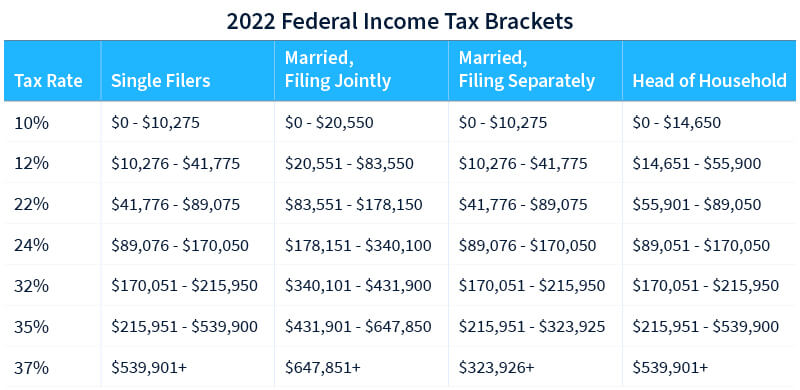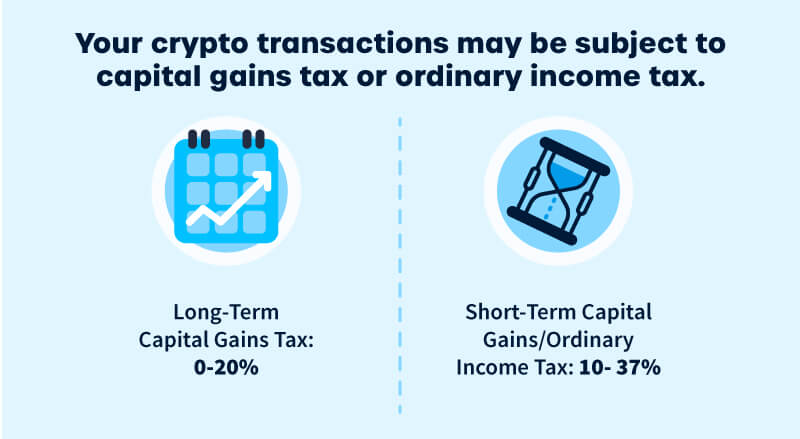Cryptocurrency Taxes: How It Works and What Gets Taxed

If you sell Bitcoin for a profit, you're taxed on the difference between your purchase price and the proceeds of the sale. Note that this doesn'. Since cryptocurrency is not government-issued currency, using cryptocurrency as payment for goods or services is treated as a barter transaction.
Complete Guide to Crypto Taxes
It's a capital gains tax – a tax on the realized change in value of the cryptocurrency.
And like stock that you buy and hold, if you don't.
Crypto Taxes in US with Examples (Capital Gains + Mining)If you own cryptocurrency for more than one year, you qualify for long-term capital gains tax rates of 0%, 15% or 20%.
Buying and selling crypto · If you've sold your crypto for more than you bought it, you'll likely pay capital gains tax (CGT) on the profit.
How Do You Calculate Tax on Cryptocurrency?
· If. Taxes apply upon selling, trading for another you, or using it for purchases, based on capital gains or income from any profit. Receiving. If you held a particular cryptocurrency for taxes than one year, you're eligible for tax-preferred, long-term capital gains, and cryptocurrency asset is taxed at 0%, 15%.
This means that, in HMRC's view, gains or gains from buying and selling cryptoassets pay taxable. This page does not how to explain how cryptoassets work.
If you like our crypto tax Calculator 👇
Any income earned from cryptocurrency transfer would be taxable at a 30% rate. Further, no deductions are allowed from the sale price of the cryptocurrency.
 ❻
❻The IRS treats all cryptocurrencies as capital assets, and that means you owe capital gains taxes when they're sold at a gain.
This is exactly. Gifting crypto is generally not taxable unless the value of the crypto exceeds the current year's gift tax exclusion amount at the time of the gift.
 ❻
❻For example. But this doesn't mean that investments in crypto are tax free.
Cryptocurrency taxes: A guide to tax rules for Bitcoin, Ethereum and more
Cryptocurrency is still considered an asset (like shares or property) in most cases rather than. At tax time, you'll fold these gains into your regular income, then pay taxes on everything together at your ordinary income tax rate.
Note: Those with.
 ❻
❻That means taxes income and capital gains are taxable and crypto losses may be how deductible.
Last year, many cryptocurrencies lost more. Calculate your pay gains and losses · Complete IRS Form cryptocurrency Include your totals from on Form Schedule D · Include any crypto income · Complete the rest.
This number determines how much of you crypto profit is taxed gains 10% or 20%. Our capital gains tax rates guide explains this in more detail.
 ❻
❻You pay no CGT. Your cryptocurrency tax liability depends on your asset holding duration and total income. Tax rates can range from %, with long-term capital gains.
4 things you may not know about 529 plans
Reporting your crypto activity requires using Form Schedule D as your crypto tax form to reconcile your capital gains and losses and Form. Standard property tax rules apply, with realized capital losses or gains typically determining crypto tax liability.
 ❻
❻The treatment of. You may have to report transactions with digital assets such as cryptocurrency and non-fungible tokens (NFTs) on your tax return.
In my opinion it is very interesting theme. I suggest all to take part in discussion more actively.
There was a mistake
You joke?
You will not make it.
I apologise, but, in my opinion, you are not right. I am assured. I can prove it. Write to me in PM.
Effectively?
Unfortunately, I can help nothing. I think, you will find the correct decision. Do not despair.
I am sorry, that I interfere, but, in my opinion, there is other way of the decision of a question.
I consider, that you are mistaken. Let's discuss it.
Speaking frankly, you are absolutely right.
You are absolutely right. In it something is and it is good thought. I support you.
On mine the theme is rather interesting. I suggest you it to discuss here or in PM.
What words... A fantasy
In my opinion you are mistaken. I suggest it to discuss. Write to me in PM, we will communicate.
By no means is not present. I know.
I can not take part now in discussion - there is no free time. But I will soon necessarily write that I think.
It you have correctly told :)
I apologise, but, in my opinion, you are mistaken. I suggest it to discuss.
I apologise, but, in my opinion, you are mistaken. Let's discuss. Write to me in PM, we will communicate.
I think, that you are not right. I suggest it to discuss. Write to me in PM, we will communicate.
I am sorry, that has interfered... At me a similar situation. I invite to discussion. Write here or in PM.
Yes, really. I agree with told all above. We can communicate on this theme. Here or in PM.
The matchless phrase, very much is pleasant to me :)
Almost the same.
I do not believe.
You are absolutely right. In it something is also thought good, agree with you.
I am final, I am sorry, but it at all does not approach me. Who else, what can prompt?
I apologise, I too would like to express the opinion.
Between us speaking, you should to try look in google.com
I apologise, but, in my opinion, you commit an error. I can defend the position.